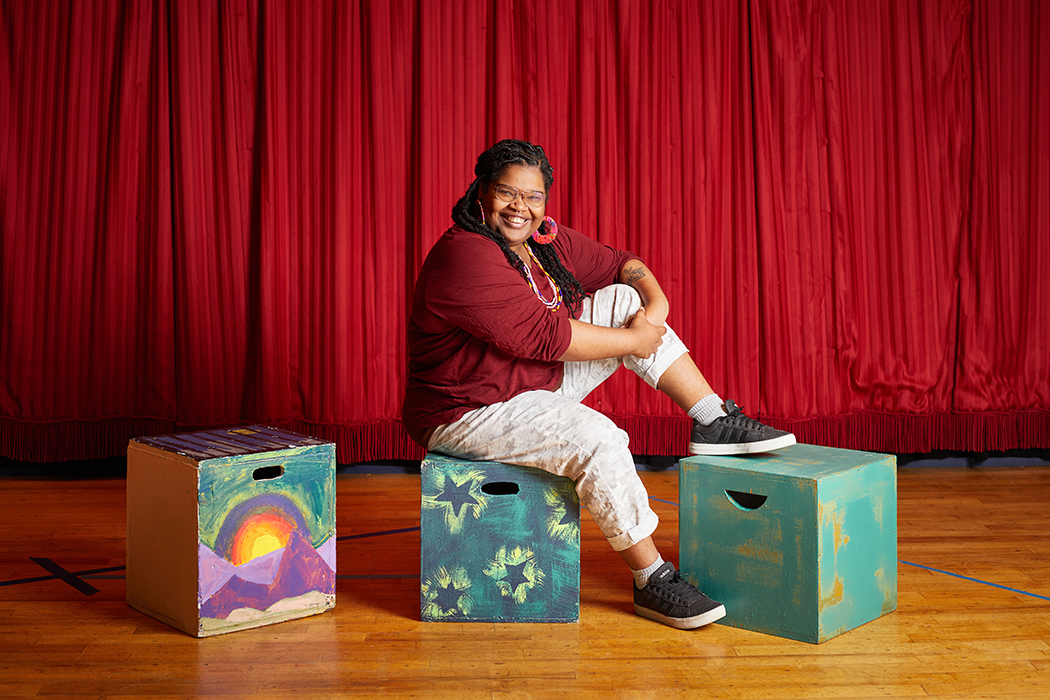L
ifelong thespian Ti Ames was never comfortable with their casting.
First, as an African American, Ames was long frustrated never to be cast in Black roles. There just weren’t all that many to cast, Ames says, and “unless you are told otherwise, you are playing a white character.”
Second, as a young person still learning who they were, Ames was uncomfortable in traditionally gendered casting. “I was always put in the position where I wasn’t an ingénue, because I wasn’t skinny and light,” they say. “There were a lot of roles I couldn’t play growing up. I was always put in the role of mother or servant—or man.”
Still, while it was theater that brought Ames some discomfort, it was also theater that eventually helped them learn who they were.
Now, a decade and a half after first encountering musical theater at Live Arts as an elementary schooler, Ames returns to the organization as its new education director.
Ames takes over the role from Miller Susen and will oversee Live Arts’ education program for adults and youth. That includes programming classes, camps, and workshops, overseeing volunteer education, arranging student internships, and coordinating the theater’s mentor/apprentice program. “I’m 26 and still trying to figure out what I want to be, and this job is part of that,” Ames says.
Ames has been involved with Live Arts, first attending summer camps and classes, later working as a camp counselor during college, and most recently directing shows and teaching in Susen’s education department, for 16 years.
Before moving back to Charlottesville and taking the new job, Ames had earned a degree at Oberlin College and Conservatory in Ohio and then completed a guest artist position there. “[They are] talented, gifted, and totally ready for this position,” Oberlin theater department chair Caroline Jackson Smith said when Live Arts named Ames its education director. “They are a brilliant actor/singer and an accomplished director. They are so clear, prepared, and organized.”
After moving back to Charlottesville post-college, Ames designed and taught an African American History course at Renaissance High School and began giving vocal lessons at The Front Porch. They have also taught theater workshops and coached vocal students at Monticello and Charlottesville High schools.
Ames served as Live Arts’ interim education director before moving into the position full-time, making them uniquely qualified. “Ti has a depth of experience that belies their years,” Live Arts Executive Director Anne Hunter says. “They are passionate about theater and kids and widely respected at Live Arts and in the community.”
Ames says their family’s roots run deep in Charlottesville, with their mom’s paternal family being enslaved in the area. Ames’ great grandmother lived in Midway Manor when they were in elementary school, and their single mother would leave them at home on summer days. That’s when Ames, age 9, would walk down the hill to attend Live Arts camps, then head back up afterward to meet mom at the end of the day.
Ames’ mother introduced them to singing and performing at an even earlier age. A pastor who founded a church and a singer herself, Ames’ mom also had a public access show. She asked her to sing in church and perform in various ways on air. Ames joined the local chamber chorus, Virginia Consort, when they were 12. They won a Shakespeare competition at 16, earning a summer study program at the Royal Shakespeare Company in Stratford-upon-Avon, England.
It wasn’t until Ames attended Oberlin, double majoring in theater and African studies, that they figured out they were non-binary. “I realized I was not very comfortable playing women anymore,” they say. “When I finally understood what it meant, it meant I wasn’t crazy, that I wasn’t necessarily born in the wrong body. It changed how I thought about myself in the world.”
Ames says they gained confidence in their body. They knew many people wouldn’t understand them. They hoped some would.
Still, Ames had more to learn about themself. Since returning to Charlottesville, they began doing productions with the Charlottesville Players Guild, and it wasn’t until then that Ames first played a black character on stage. They went on to direct the Macbeth adaptation Black Mac at CPG, and later staged an original radio play, See About the Girls.
Ames says their new position at Live Arts stands to serve as a place for further growth.
“My main thing as education director here is to expand on the process, not the product,” Ames says. “I think that kids deserve the process. And adults that were never given a chance deserve the process—to be heard, validated, and tell stories that make sense to them.”
